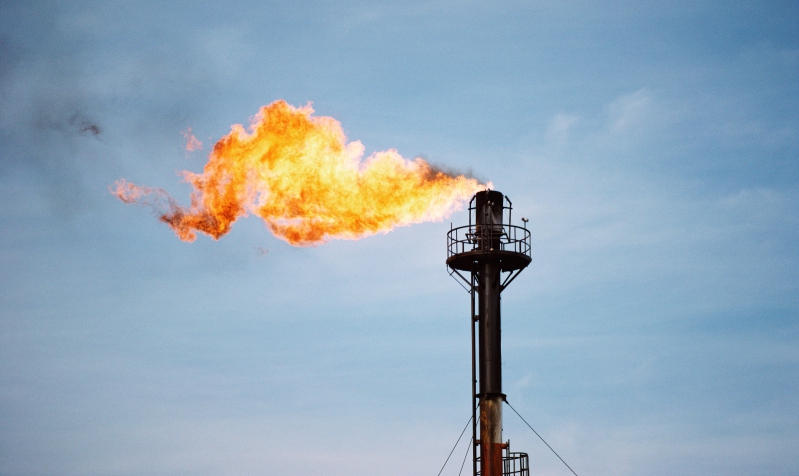
Scholars discuss regulating methane emissions released by industry activity.
Although conversations about climate change usually revolve around carbon dioxide emissions, another greenhouse gas deserves attention: methane. Scientists think that reducing methane emissions is critical for mitigating the climate crisis.
Methane contributes to climate change by trapping heat in the atmosphere. Although methane remains in the atmosphere for less time than carbon dioxide, it affects the climate 86 times more than carbon dioxide over a 20-year span. Scientists found that reducing methane emissions in the short term can slow down global warming: a key goal for the international community.
Many industries, including agriculture, oil and gas, and landfill disposal, conduct business activities that emit methane. The United Nations identified the fossil fuel industry as having the greatest capacity to reduce methane emissions at low cost. Oil and gas activities generate 35 percent of total U.S. methane emissions.
In April, members of the U.S. Congress rescinded Trump-era relaxations of methane regulations in the oil and gas sector. As of now, there are two main federal proposals that seek to further reduce methane emissions.
First, Democrats in Congress are working to introduce a $1,500 fee on every metric ton of methane released by the oil and gas sector. Second, the U.S. Environmental Protection Agency (EPA) plans to require oil and gas companies to use equipment and procedural practices that curb methane emissions.
But some commentators argue that the two proposals may conflict with each other.
On one hand, fossil fuel lobbyists argue that the proposed fee and proposed EPA regulation are duplicative and add burdensome costs for companies. On the other hand, environmentalists argue that the proposed fee and proposed rules complement each other. They point out that if companies successfully lower emissions under the rules, then less fees would be owed.
Although neither the proposed fee nor the proposed EPA rule is final, both regulations likely will play a role in efforts to curb the effects of climate change.
This week’s Saturday Seminar discusses the regulation of methane emissions within the context of climate change.
- In 2020, President Donald J. Trump withdrew the 2016 New Source Performance Standards (NSPS) requiring the EPA to extend the regulation of methane emissions, explains Robert L. Kleinberg of Columbia University’s Center on Global Energy Policy and Boston University’s Institute for Sustainable Energy. In a recent article, Kleinberg argues that the new rules would inhibit widespread deployment of “new techniques which can deliver better environmental outcomes at lower cost to regulated entities.” The new NSPS regulations also signal to other nations that the United States does not prioritize global environmental protection, Kleinberg suggests.
- In a report published by Resources for the Future, Clayton Munnings and Alan Krupnick argue that most existing sources of methane emissions remain largely unregulated due to concerns over administrative and compliance costs. Munnings and Krupnick analyze several prototypical regulations that would reduce methane emissions and assess the extent to which they offer effective incentives for abatement. After comparing such policies, Munnings and Krupnick suggest that a market-based approach such as a pollution tax with adaptable leakage rates—which measure the amount of methane emissions from the natural gas industry—may be both economically efficient and environmentally effective.
- The Obama-era EPA rules on methane pollution from stationary sources exhibit the “coherence and clarity” of a good regulatory system, Oyetade Oyewunmi of Tulane Law School argues in an article published in the LSU Journal of Energy Law and Resources. Oyewunmi explains that the 2016 EPA methane rule requires operators to locate and repair leaks, reduce natural gas venting, and limit emissions from storage tanks. Oyewunmi questions whether the Trump administration’s later efforts to scale back the rule were legitimate attempts to reduce “unnecessary” regulations or simply a mechanism to enrich the oil and gas industry. Oyewunmi urges increased efforts to identify such misaligned interests that work against public health, safety, and the environment.
- In a forthcoming article in the Yale Journal of Regulation, Richard L. Revesz and Max Sarinksy of the New York University School of Law argue that regulators should incorporate the social cost of greenhouse gases when they measure the climate damage caused by federal programs and project applications. This metric estimates monetary damages caused by greenhouse gas-associated changes in agricultural productivity, human health, and property damage. According to Revesz and Sarinksy, the social cost of greenhouse gases can help agencies make decisions about project approvals and grant rewards because it conveys the actual climate impacts posed by the decision better than simple emission measures. Furthermore, Revesz and Sarinksy argue the metric can help regulators impose the costs of climate change on energy producers through mineral royalties, administrative penalties, and decreasing wholesale electricity rates.
- In an article in the Idaho Law Review, Arnold W. Reitze Jr. of the S.J. Quinney College of Law discusses federal and state regulations of methane emissions from the oil and gas industry in the western United States. Many EPA standards only apply to new, reconstructed, and modified gas operations and cannot cover existing operations. Reitze explains that existing operations fall mostly under the responsibility of the states. At the state level, Reitze explains that the effectiveness of a regulation usually depends on how well it is enforced. But many enforcement efforts face funding issues that render compliance a choice for industry.
- In a working paper for the World Resources Institute, Tom Cyrs, John Feldmann, and Rebecca Gasper of the World Resources Institute explore the opportunities presented by renewable natural gas (RNG), otherwise known as biomethane. Cyrs, Feldmann, and Gasper argue that RNG offers a dual climate benefit of mitigating fossil fuel dependence and of using up methane that would otherwise enter the atmosphere. They recommend ways to encourage RNG development such as fuel mandates, public financing of RNG projects, and establishing regulatory certainty through clear guidelines and standards.
The Saturday Seminar is a weekly feature that aims to put into written form the kind of content that would be conveyed in a live seminar involving regulatory experts. Each week, The Regulatory Review publishes a brief overview of a selected regulatory topic and then distills recent research and scholarly writing on that topic.



